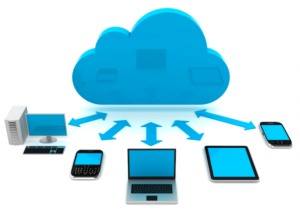Keeping your data secure when using cloud services
What are cloud services?
If you’ve ever streamed a show on Netflix or Philo instead of watching a physical DVD or VHS, you’ve used a cloud service. The ability to access data from virtually anywhere and from any device is made possible by the use of cloud services. Thanks to cloud services, data can live on one or more servers, often called “the cloud,” instead of residing on just one device (like a computer, phone, hard drive or DVD). Devices can connect to the cloud to access text files, emails, movies and shows, and more. Some well-known cloud services include Google Docs, Dropbox, and the Office 365 suite.
Here are just a few ways you’ve probably used cloud services:
- Syncing the photos on your phone to an online file storage app, such as Google Drive or Apple’s iCloud
- Collaborating with other people on a single Google Doc or Word Online
- Typing a note on your computer and it automatically syncing with your phone
- Sharing files with coworkers using Office 365 or Sharepoint.
While cloud services can be useful for collaboration and file sharing, it’s important to know how to use these services safely to keep company data secure. The “Securing the Human” series from the SANS Institute has provided an educational video explaining how to practice safe use of cloud services. This video focuses on the business use of cloud services, as well as tips for keeping personal data safe.
Watch the video below to learn more about cloud services and how to secure your data:
Video takeaways:
- Cloud services allow you to access documents, pictures, notes, etc. from multiple devices.
- Keep track of what you have shared with whom and periodically remove users who no longer need access.
- Use unique passwords for each of your cloud accounts. (A password manager, like LastPass, can help manage all those passwords)
- By default, set cloud accounts to “private” to prevent sharing data with unauthorized users.
- Be careful not to access or share work data via your personal accounts.

 Follow
Follow